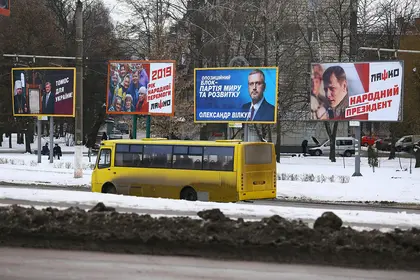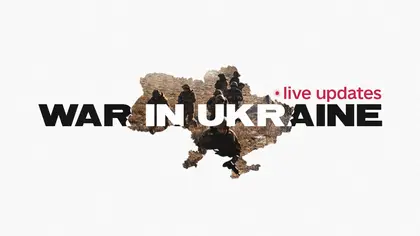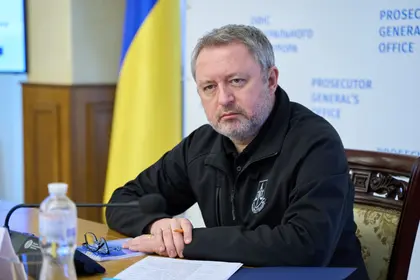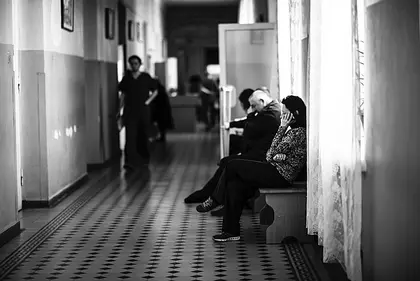Editor’s Note: Election Watch is a regular update on the state of the presidential race in Ukraine. The country will elect its next president on March 31, 2019, with a possible runoff on April 21. The Election Watch project is supported by the National Endowment for Democracy. The donor doesn’t influence the content. Go to kyivpost.com for more election coverage.
Two-and-a-half months away from the day of the voting on March 31, the set of the candidates is still far from finalized.
The race’s current leader, ex-Prime Minister Yulia Tymoshenko, is set to file her candidacy after the Jan. 22 congress of her party, Batkivshchyna.
However, one heavyweight and several lightweight candidates registered this week, and several more announced their plans to run — including a couple of surprising ones.
Why Poroshenko waits
President Petro Poroshenko doesn’t hurry to officially announce his bid for re-election. Yet he campaigns more than anyone else.
In the past two weeks, Poroshenko has been touring Ukraine in celebration of the creation of the united Orthodox Church of Ukraine earlier in January. Accompanied by the leadership of the new church, he showed up in Zhytomyr, Rivne, and other cities. He brings along the “tomos,” an archaic-looking handwritten decree granting the Ukrainian church the status of equality with others in the Orthodox hierarchy, ending its subservience to the Russian church.
Such visits in the company of the church leadership would be impossible had he become a candidate already, according to Epiphanius, the head of the newly-created church, who said so in an interview to Ukrainian journalist Sonya Koshkina.
During the latest event of the tour, in Zhytomyr, a city 140 kilometers away from Kyiv, on Jan. 17, some 300 people showed up to see the president and the “tomos” document. Children were brought to sing for the president and pose for photos with him. They were brought ahead of time and waited for an hour for the president to arrive. Poroshenko had at least three meetings like that in Zhytomyr Oblast in one day.
To make sure people pay attention to his role in the church independence, Poroshenko’s latest billboards show the president with Epiphanius and the “tomos” itself. Placed on the way from Boryspil International Airport to Kyiv, the billboards showing the president next to a colorful scroll must look confusing to the foreign guests of the capital.
New candidates
The Central Election Commission registered eight candidates as of Jan. 17, adding three in the past week. The latest are Anatoly Grytsenko, the head of the Civil Position party and ex-defense minister; independent lawmaker Vitaliy Kupriy; and lawmaker Yevhen Murayev, ex-member of the Opposition Bloc and former NewsOne TV channel owner.
Out of them, only Grytsenko stands a chance at winning, according to the polls. However, Grytsenko, who was leading some polls in mid-2018, was since then pushed a couple of the positions down in the ratings. He is still in the top five but has lost leadership to populist candidates like ex-Prime Minister Yulia Tymoshenko and show business stat Volodymyr Zelenskiy.
Grytsenko has been saying he is independent of oligarchs, reflected in the tiny amount of advertising he has been able to afford.
Still, Grytsenko enjoys a support of democratic politicians, some of whom joined the Civil Position’s forum on Jan. 11, where the party nominated him for the presidency.
Among several candidates who registered this week is Roman Nasirov, who remains a suspect in a large-scale corruption case since March 2018. The court has reinstalled Nasirov as the head of the State Fiscal Service in December, returning him the job he lost after the criminal case took off.
Meanwhile, a former top journalist Dmytro Gnap won the primaries inside a smaller democratic party People’s Force (Syla Liyudey), confirming he will run for the presidency.
Gnap quit journalism for politics in June 2018 and hasn’t been featured in the polls yet. He told the Kyiv Post he was ready to work in the government under a decent president if he himself didn’t win.
Surprise candidates
Among the surprise candidates of the week is Igor Smeshko, who led the Security Service of Ukraine during the second term of President Leonid Kuchma, who ruled from 1994–2005.
Smeshko, an ex-military man, has been keeping a low profile. He is mostly remembered not for his professional activities, but as a participant of a private dinner in September 2004. At the time, then-presidential candidate Viktor Yushchenko dined with Smeshko and his deputy. Soon, Yushchenko fell ill to what he said was a dioxin poisoning. He said he was poisoned at the dinner and that it was an assassination attempt.
In a recent TV interview, Smeshko said that if it really was him who wanted to kill Yushchenko with poison, he would have been dead.
Another surprise is Yulia Lytvynenko, a TV host who will run for president. After the announcement, Lytvynenko placed online ads where she attacks other candidates. Her main target is Tymoshenko, whom she asks how she is “not ashamed to look people in the eyes.” Lytvynenko’s name and looks are similar to Tymoshenko’s.
Her other target is Zelenskiy, a fellow TV personality. She accuses him of being a front for billionaire oligarch Ihor Kolomoisky, his business partner. Lytvynenko’s latest employer was Pryamiy, a TV channel officially owned by lawmaker Volodymyr Makeyenko, a Poroshenko loyalist.
Oligarchs and TV
Kyiv-based think-tank Ukrainian Institute of the Future pulled together the ratings of Ukraine’s TV channels and records of their ownership to find out how much of the Ukrainian TV is actually controlled by oligarchs.
The result showed that 76 percent of all the television watched in Ukraine is controlled by the same four oligarchs: Victor Pinchuk, Rinat Akhmetov, Dmytro Firtash, and Kolomoisky.
Pinchuk came on top — his ICTV, STB and Novy Channel are watched by 20.8 percent of the TV audience. Judging from ICTV, its owner isn’t backing one candidate in the presidential race: While the channel hosted Poroshenko several times in 2018, it also welcomed Tymoshenko for a 1.5-hour talk show on Jan. 11.
Tymoshenko opened her monologue by saying she was banned from most other TV channels due to censorship.
Pinchuk is followed by a union of Firtash and Lyovochkin, who co-own Inter and several smaller TV channels, together covering 20.5 percent of the audience.
Kolomoisky’s share of the television market is 18.7 percent, thanks to the 1+1 Group, that includes 1+1, 2+2, TET and two niche stations.
Akhmetov’s Ukraina Channel often leads the TV ratings thanks to its soap operas, but since the oligarch’s only other channel is an unpopular entertainment station NLO, it added up to only 16.8 percent of the market.
You can also highlight the text and press Ctrl + Enter







Comments (0)